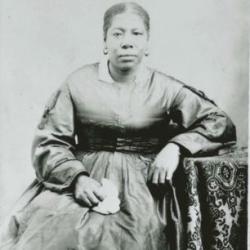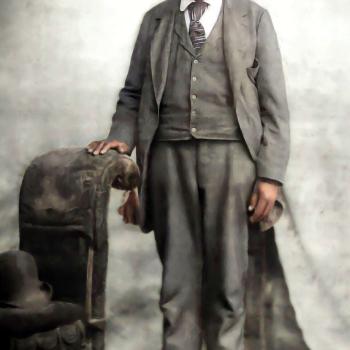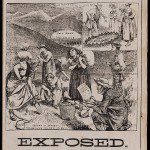 We are continuing our conversation about Dr. Michael Gorman’s new book The Death of the Messiah and the Birth of the New Covenant (Wipf & Stock, 2014). You can find the first part of the interview HERE.
We are continuing our conversation about Dr. Michael Gorman’s new book The Death of the Messiah and the Birth of the New Covenant (Wipf & Stock, 2014). You can find the first part of the interview HERE.
Crux Sola: You have talked at length about “cruciformity” in Paul, but have only recently begun discussing the cruciform teachings of Jesus as remembered by the evangelists.
Gorman: While it’s true that I’ve not written much before about cruciformity in the Gospels and in the teaching of Jesus, that’s primarily because I’ve not written much on the gospels, not because my thinking has changed. My first serious published effort in this area was for the Frank Matera Festschrift published in 2012 and co-edited by Chris. It is incorporated in revised form in this book. But even in my Wesley Study Bible notes on John I had written about the Gospel’s “cross-centered spirituality and discipleship.”
Crux Sola: In the latter chapters of the book you argue that “peace” as a benefit of Christ’s ministry is somewhat overlooked by scholars working on both the Gospels and Paul. To what do you attribute this oversight, and why are you convinced that peace(making) is such an integral component of our understanding of the atonement?
Gorman: Let me begin with the second question. One of the major theses of this book is that what God has done on the cross is not only something from which we benefit but also something in which we participate. One of the most significant images of the atonement, especially (but not only) in Paul and Luke, is reconciliation and peacemaking. If God in Christ is a peacemaker, bringing about peace between us and God as well as within divided humanity, then peacemaking has to be central to Christian identity and mission. Furthermore, if the prophetically promised covenant of peace is not something other than the prophetically promised new covenant, and if that covenant of peace/new covenant has been inaugurated by Jesus’ death, then peace and peacemaking are (again) central to the atonement and to our participation in it. Finally, and similarly, if we believe that Jesus’ ministry, death, and resurrection inaugurate as well the promised era of shalom, then how can peace be anything but central to everything we believe and practice? New covenant and new creation are closely connected.
As to why this has been neglected, I’m not sure. I suspect it has something to do with the apparent lack of direct references to peace in certain parts of the New Testament, but I also think it may have something to do with the church’s general ambivalence about peace because, on the whole, it has embraced the alleged necessity of violence until the kingdom comes in its fullness. My reading of the New Testament challenges that perspective. (Of course I’m not alone in this.)
Crux Sola: Who have been some theologians, biblical scholars, and thinkers who have shaped your atonement theology, and your theology overall (especially as you reflect on influences in relation to this work)?
Gorman: Far and away the most influential biblical scholars on my work in general are my good friends Richard Hays and Tom Wright. For this book, Richard’s insistence on narrative, transformation, and participation comes through, and Tom’s focus on new covenant. Merge them and you get me! But overall I would not attribute what I’m doing to their influence as much as I would say that I resonate with certain aspects of their work, and have done so since I first met their work decades ago.
More specifically on atonement among biblical scholars, another good friend, Joel Green, and Scot McKnight have been helpful in stressing plurality (both Joel and Scot) and community (Scot). And I’m also quite sympathetic to Morna Hooker’s work on Jesus’ death, especially its connection to incarnation, transformation, and mission. Similarly, I find Kathy Grieb’s work in this area, bridging atonement and justice, very important.
As for the emphasis on peacemaking, Willard Swartley has been quite helpful and influential. And of course other major influences on this aspect of my work, and to my claims about a distinctive, even “alter-cultural” new-covenant people, are Stanley Hauerwas and the late John Howard Yoder, but also Bonhoeffer. They have taught me how to read the Bible theopolitically in the best sense of that word.
For theologians on the atonement, I’ve come to appreciate the late T. F. (Tom) Torrance, whom I met at Princeton in the ‘80s, and Kevin Vanhoozer: Torrance for his openness to theosis and his connection of atonement to both incarnation and new covenant, and Kevin for his connection of atonement to the new covenant. I came to my perspective before encountering their work, but their work has helped sharpen mine and especially given me confidence that it is the right way to go.
Crux Sola: Would you mind sharing what other writing projects you have planned? Also, can we expect “new covenant” language and thought to be integrated into those works?
Gorman: Yes, “new covenant” is here to stay. I have a book in press with Eerdmans that will appear around May of next year (2015) titled Becoming the Gospel: Paul, Participation, and Mission. It builds on all of my previous work on Paul but also assumes, and refers to, the argument of Death of the Messiah and to the significance of new-covenant theology for Paul. I’m also writing the Two Horizons commentary on 2 Corinthians, so that will obviously focus on the new covenant (see 2 Cor 3:6). And more immediately, I will be presenting a paper called “The Apocalyptic New Covenant and the Shape of Life in the Spirit” at a pre-SBL conference on Paul and apocalyptic, and that paper will be published in a book based on the conference. And who knows, there may be more.
You can also expect more about peace and peacemaking. There are two chapters on this in the book on Paul and mission.
Thanks for this opportunity, Chris and Nijay, and for the great questions!
Crux Sola: Thanks, Mike! Looking forward to these other publications and information! As for our readers, I hope this inspired you to have a look at the book.















